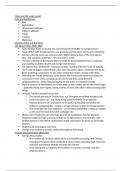China and the wider world
Potential Subthemes
War
Exploitation
Government attitude
Citizen’s attitude
Trade
Treaties
Diplomacy
Manchu China and the West
The Opium Wars 1840-1860
Some foreign trade occurring, tea and chinoiserie desirable to foreign powers
Trade deficit with foreign powers was growing, and the silver stores were depleting
Contact with the west was enforced after 1840, following loss of the First Opium
War, and would be until Mao’s rise to power in 1949.
The loss to Britain in the Opium Wars of 1840-60 demonstrated China’s weakness
and inability to defend itself from foreign interference.
The Opium Wars birthed the ‘Unequal Treaties’ starting with the Treaty of Nanjing
The Treaty of Bogue named Britain ‘the most favoured nation’, entitling them to be
given matching concessions to any other nation that made a treaty with China.
Following the Treaty of Nanjing, other power like France and Russia scrambled for
concessions from China, bringing up any old wrong they could demand
compensation for, hence Nanjing leading to the series of Unequal Treaties
Start of Century of Humiliation for China, both in the country and on the world stage
– gradually losing sovereignty, losing a series of wars with other nations among other
things.
Unequal Treaties included terms like:
o The forced opening of Treaty Ports, e.g. Shanghai, mandated foreign trade
o Land to be given up – e.g. Hong Kong ceded to Britain ‘in perpetuity’
o Massive amounts of concessions to be paid, e.g. Nanjing demanded $21
million in compensation – China in a huge amount of debt to foreign powers
o The exchange rate was exploited – concessions demanded in Mexican Dollars
as this was the most desirable exchange rate
Opium wars resulted in not only huge amount of humiliation, but the Unequal
Treaties resulted in huge amounts of debt to foreign powers, forced trade with
foreign powers so the deficit continued to build, and land to be given up to foreign
powers.
Huge loss of sovereignty over time.
Foreign encroachment would continue throughout the period.
Foreign Encroachments 1860-1901
Foreign Missionaries
o The number of Christian missionaries was steadily increasing, and Chinese
resentment towards them, particularly due to them receiving legal immunity
and their patronising attitude towards the Chinese.
o They attempted to suppress the tradition of ancestor worship, and this
angered citizens.
, o The Tianjin Massacre 1870 – series of attacks on missionaries, cathedrals, and
churches. 60 died.
o Europeans demanded the government take responsibility, the Manchu
government gave in.
o Foreign nationals keener to maintain a strong European military presence.
Imperial Bank of China opened in 1897 – attracted foreign investment. Had intended
to be independent of foreign influence but relied on foreign input. E.g. $40 million
dollar advance from USA
Sino-Japanese War 1894-5
China lost
Forced to give up all claim to Korea
Pay an indemnity of $213 million silver dollars to Japan
Japan took possession of Taiwan, Liaodong in South Manchuria, and the Pescadore
Islands.
Japan given right to build factories in treaty ports, and some treaty ports had to be
open to Japanese trade.
Triple Intervention – France, Germany and Russia wanted to protect their interests,
pressured Japan into giving up Liaodong in exchange for compensation, and it was
immediately occupied by Russia.
The Boxer Rebellion and response 1898-1901
Scramble for Concessions – China forced into another series of Unequal Treaties in
the late 1890s
Concerns China would be broken up, USA’s Open Door policy saved China from this
to prevent any one country losing their interests in the country.
The Boxer Rebellion was strongly focused on anti-foreigner sentiment
Backed by Cixi in order to attempt to win China back from foreign influence
1900 – the foreign legation in Beijing is besieged for 55 days, over 50,000 foreign
troops are assembled in an Eight Nation Alliance.
The Boxer Protocol 1901 –
o further loss of sovereignty in provinces that aided uprising but may have
saved China from being split up.
o £68 million in reparations
o Foreign troops permanently stationed in Beijing
o Foreign powers entitled to defend legations with their own military
o Gentry in provinces involved punished by having official examinations banned
for 5 years.
o Provinces that were not involved were not punished
The Republic and the Wider World
Yuan organised a large foreign loan with US of $100 million
In return he pledged future tax revenues, to recognise British control of Tibet, and
Russia’s control of Mongolia.
Heavily indebted to a foreign power
Japan’s 21 Demands 1915:
o Further loss of sovereignty to Japan, even if not all were implemented
o Demands included Japanese involvement in politics, economics, the military,
police and an agreement to purchase a fixed amount of munitions from
Japan.




